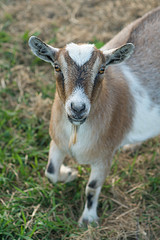
In September 2007, the City of Seattle approved pets – and livestock – in the city limits. Seattle urban farmers can how keep 8 chickens, 4 bee hives, and 3 miniature (dwarf/pygmy) goats or rabbits on standard residential lots. (Here’s a copy of the city regulations.) You can’t have roosters and your goat (if male) must be neutered. But then if you want milk and eggs, those are moot points.
That’s quite a barnyard! Add an intensely managed garden plot if you have the right exposure and you can almost feed your family. If you can figure out how to snare a few of the extremely fat gray squirrels in the city, you can add one more protein source to your diet.
That’s the good news. Now for the bad news…
Chickens and goats – even if you consider them pets – are basically livestock. They need to be fed twice a day, the goats milked twice a day, and often need veterinary treatment for a variety of common ailments. Or you need to learn some veterinary basics yourself.
Goats are active and they are browsers. That means that if you have trees or shrubs in your yard, fence them off or they’re goat snacks.
Be prepared to drink and/or eat your production! A goat can give you a half gallon of milk – or more – a day. And a chicken will lay an egg a day during her peak production season.
In Fresh Goat Milk, Dead Wood, and Dubious Neighbors, you can read about the challenges and benefits of raising goats in the city. While it is said that good fences make good neighbors, goats and chickens can bring out the worst in those close by.
If you are ready to take the challenge, reach out to a group like Seattle Tilth, which offers urban livestock classes.
Photo credit: Pete Markham, used with permission under Creative Commons license.
